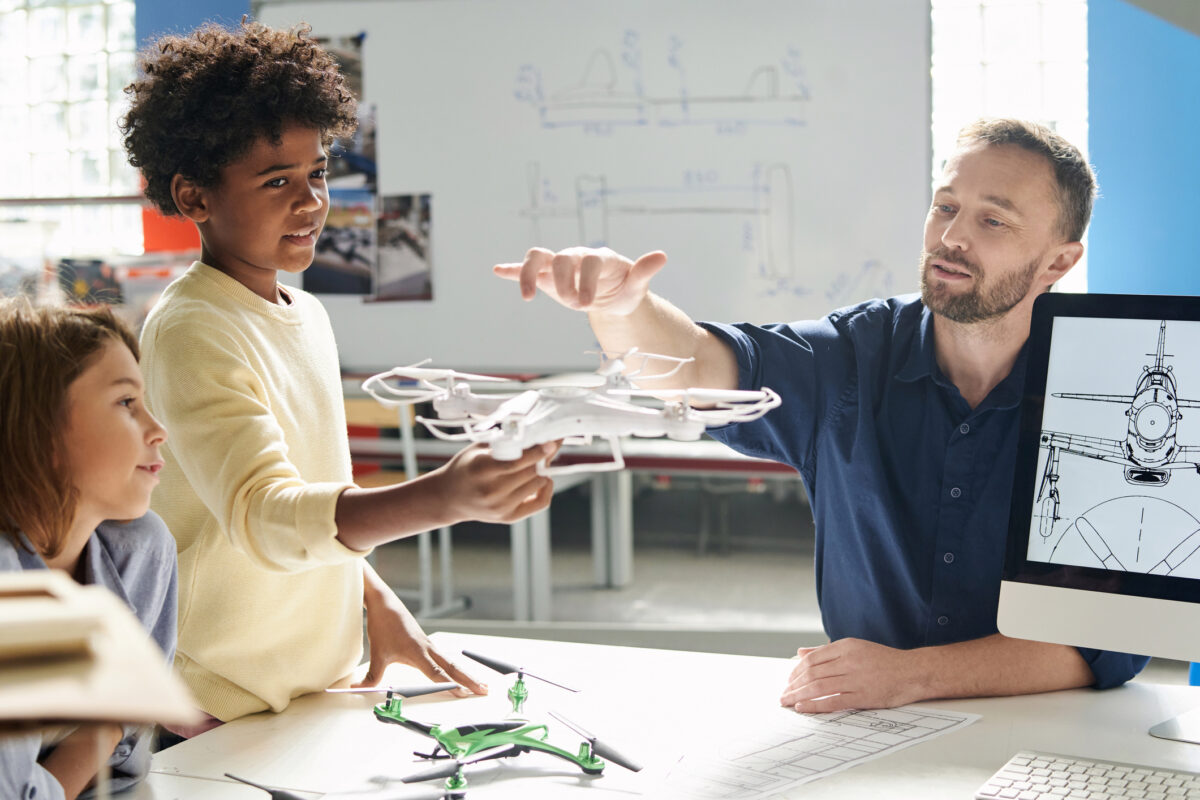
15 Jul The Young and the Restless: Youth Work Skills for an Automated Age

At the Big Bang Fair held at Birmingham’s NEC, pupils cluster around floor tiles in a screen-free coding workshop, excitedly placing colour-coded tiles that allow them to code pathways for a mini car robot. This scene and the many like it, unfold through various workshops at the fair, encapsulate the very fabric of tomorrow’s workplace. A workplace where AI and human ingenuity intertwine. This year’s World Youth Skills Day’s theme is Youth empowerment through AI and digital skills. We have been exploring the skills today’s young people will need to increase their employability in the coming decade.
AI tools have taken over many entry-level or early career professionals’ tasks, particularly repetitive administrative ones. In an interview, Sam Altman, CEO of ChatGPT, said, “All repetitive human work that doesn’t require a deep emotional connection between two people will all be done in the next couple of decades better, cheaper, faster, by AI.” This trend is set to continue as AI deployment increases.
Young Brits trying to enter the job market are particularly hard hit, as the FT articulates: “Job openings for UK graduates are at their lowest level since 2018 as employers hold off hiring and seek to cut costs by using AI.” However, 24% of companies globally are hiring because technological advancements require new expertise and skills (ManpowerGroup, 2025) . If younger generations can learn AI, digital, and interpersonal skills early, they have an opportunity to gain a foothold in their careers.
Our take: There are two main ways to succeed: lean into technological change in the new hybrid human/AI model and lean into the skills that make us uniquely human.
Technology builders and collaborators
“You’re not going to lose your job to AI. You’re going to lose your job to somebody who uses AI.” – Nvidia CEO Jensen Huang. Many workers who are succeeding see AI not as a threat but as an essential tool and collaborator. Like Luke Skywalker in his X-wing, the loveable R2D2 didn’t replace our hero, but became his most trusted co-pilot, troubleshooting mechanic, and flight companion.
For some students, they won’t just be interacting with or impacted by the future of work but actively creating it. According to the WEF Future of Jobs Report , “AI and big data top the list of fastest-growing skills, followed closely by networks and cybersecurity as well as technology literacy.” Many of the emerging jobs will be found helping to create the technology of the future in these growth industries.
The Human edge: leaning into our uniquely human skills
As the market becomes even more oversaturated with degrees and AI agents can learn qualifications in hours, multi-skilled personnel, with recommendations and work experience from others, will be in demand more than ever: Two-thirds of UK companies now prefer someone with relevant soft skills over someone with the ‘correct’ degree for the industry, (Indeed via. People Management, 2024)
One of these skills is critical thinking: ‘conceptualizing, applying, analysing, synthesizing, and/or evaluating information gathered from experience, reflection, reasoning, or communication, as a guide to belief and action’, based on ‘universal intellectual values that transcend subject matter divisions: clarity, accuracy, consistency, relevance, sound evidence, good reasons, depth, breadth, and fairness’, defined by The Foundation for Critical Thinking. This skill allows people not only to have the information but also to know what to do with it. This will likely be necessary in the future, seeing that even the most advanced AI models currently struggle with nuanced reasoning and contextual judgment.
Another skill young people will need is adaptability. As the workforce continuously evolves, micro jobs, freelancing, and short-term contracts increasingly challenge the standard 9-5 model. Nearly half of hiring managers intend to increase freelancer use in the next five years (Upwork, 2025) . Being able to work on increasingly disparate projects with changing tools and systems will be beneficial, and to do this effectively, a high level of adaptability is required.
Lastly, communication skills. Humans are likely to still outperform when communicating person-to-person across departments and companies. With collaboration increasing in the workplace between global and remote workers, technology cannot replace relationship formation, persuasion, or trust.


